Caribbean Digital transformation

FRAMEWORKS AND INITIATIVES
MEETING
Experts review how time-use surveys
CAN GUIDE SOCIAL POLICIES


FRAMEWORKS AND INITIATIVES
MEETING
Experts review how time-use surveys
CAN GUIDE SOCIAL POLICIES
ENERGY AND DISASTER RISK MANAGEMENT SECTORS
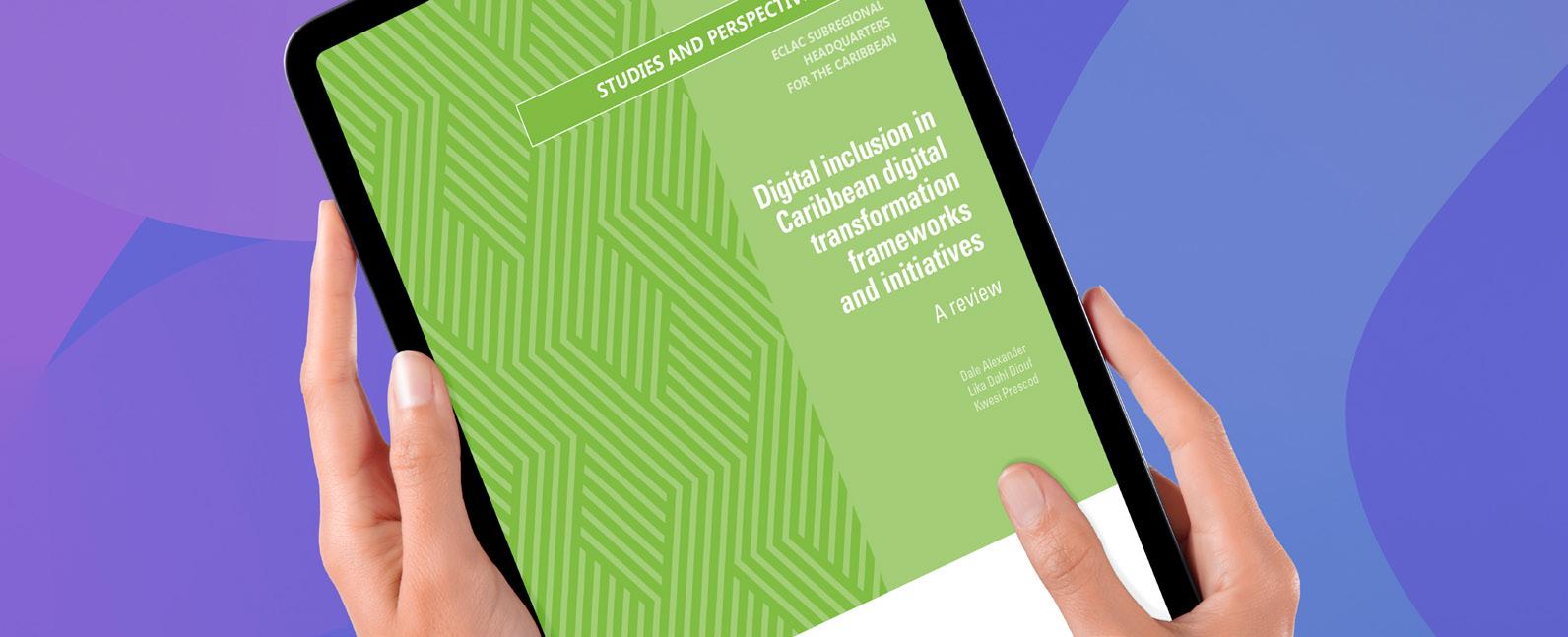
Issued on a monthly basis, The Hummingbird offers insights into the latest projects, publications, technical assistance missions and research carried out by ECLAC Caribbean. In addition to these, sneak previews are provided of the most salient upcoming events, alongside enriching followups to previously covered issues. With a view to featuring a variety of facets of Caribbean life and lifestyle, The Hummingbird also zooms in on cultural activities and landmark occurrences through an eye-opening regional round-up.
Editor: Jabari Fraser
Copy Editor: Denise Balgobin
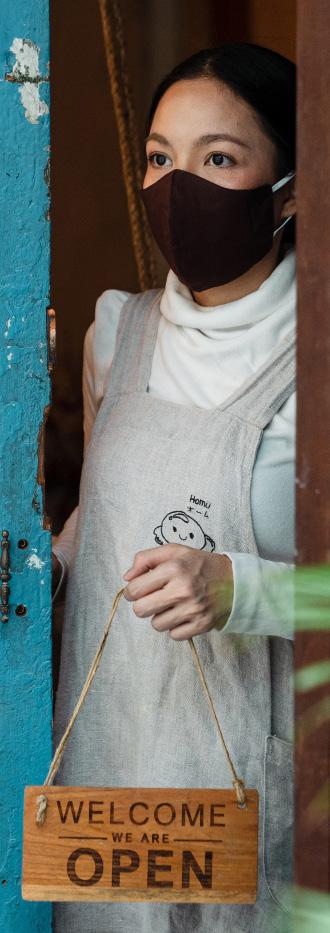
Proof Reader: Veera Deokiesingh-Fraser
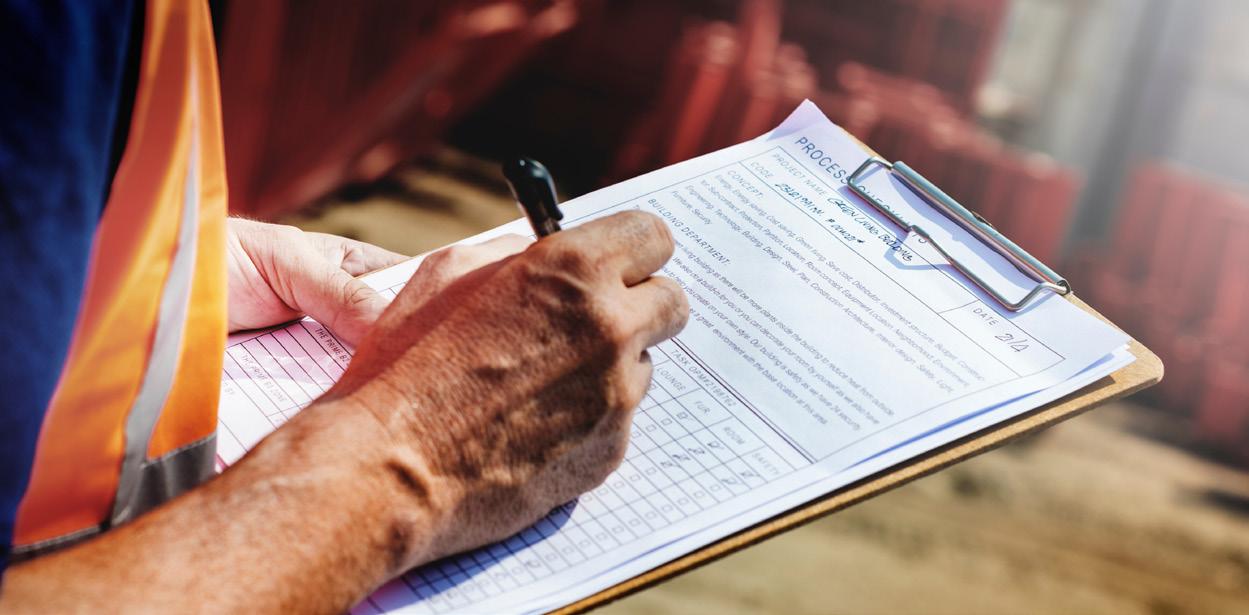
Publication Design: Liseanne Martin-Subero
Please see our contact details on the back cover of this magazine.
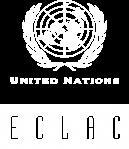
3 March
World Wildlife Day
8 March
International Women's Day
25 March
International Day of Remembrance of the Victims of Slavery and the Transatlantic Slave Trade

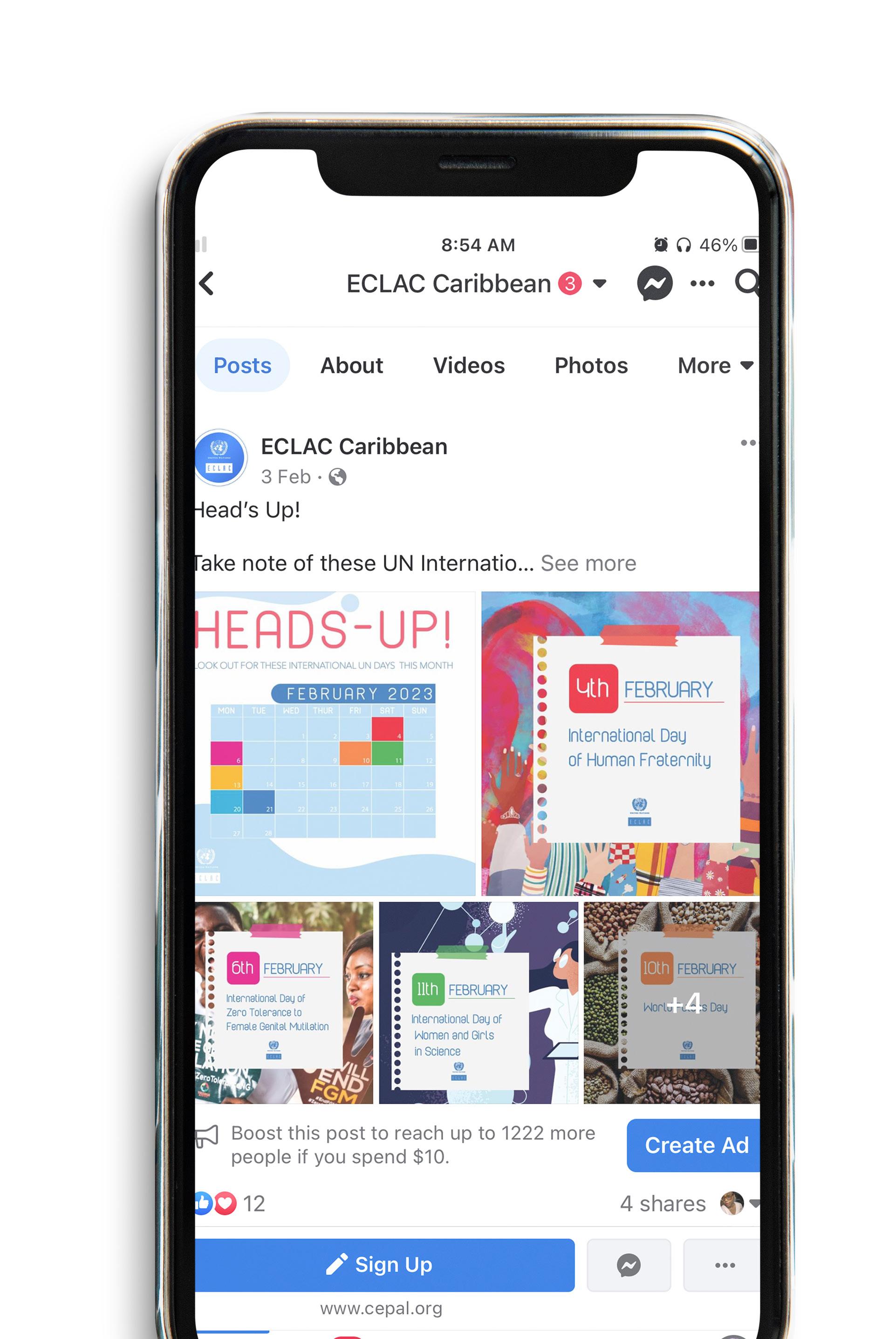
9 MARCH 2022
Virtual side event: Challenges for pension systems within the framework of universal social protection systems in Latin America
16 MARCH 2022
National Consultation - Sustainable Recovery and Resilience towards achieving the Sustainable Development Goals in the Commonwealth of Dominica
22 MARCH 2022
National Consultation - Sustainable Recovery and Resilience towards achieving the Sustainable Development Goals in Trinidad and Tobago
 BY TRICIA BLACKMAN AND ALICIA JOGIE
BY TRICIA BLACKMAN AND ALICIA JOGIE
asserted Diane Quarless, Director of ECLAC Caribbean, during her opening remarks at an Expert Group Meeting to review the study “Digital Inclusion in Caribbean Digital transformation frameworks and initiatives”, which was virtually convened on 5 October 2022. The main digital transformation dimensions examined were broadband speed, access to devices, online content, and digital skills training.
Director Quarless further pointed out that several regional and international initiatives, frameworks and agendas, including the 2030 Agenda for Sustainable Development and the Digital agenda for Latin America and the Caribbean (eLAC2022), were the motivation for the study.
Dale Alexander, Chief of ECLAC Caribbean’s Caribbean Knowledge Management Centre (CKMC), stated that the research aimed “to identify a baseline from our assessment of the policy framework” that address digital transformation, within the 11 countries that were selected for the study.
Lika Døhl Diouf, Associate Programme Management Officer, ECLAC Caribbean, stated that the study highlighted the diversity of the countries and territories in the Caribbean, including the varying factors of population, multi-island States
“Digital inclusion is inextricably linked to social inclusion and social inequality”
and language, and that countries were at different stages of policy development. National policies were reviewed through the lens of digital transformation, the digital divide and digital inclusion.
She added that there was a shift in the objectives of the study due to the COVID-19 pandemic, which resulted in a lack of access to data. Findings showed the availability of only a few ICT plans, but several countries were in the process of drafting such plans. The key recommendations of the study include the development of multisectoral digital transformation plans, regular reporting of such initiatives, the development of Caribbean-centric metrics and ICT skills, as well as greater awareness of data privacy and cybersecurity issues.
ECLAC consultant, Kwesi Prescod, informed that access, motivation, skills and trust were the four components of digital inclusion for data collection for Aruba, Barbados, Belize, British Virgin Islands, Grenada,
Guyana, Jamaica, Saint Lucia, Saint Vincent and the Grenadines and Trinidad and Tobago.
Experts at the meeting applauded the focus on digital inclusion and its importance for bridging ICT gaps within society. They noted that this research would be very useful to the subregion and that it could impact development and improve the lives of citizens. CARICOM's representative, Jennifer Britton said the research was of great interest to CARICOM, since they had several regional plans in ICT for development and welcomed collaboration with ECLAC in the future.
In an interview following the meeting, Diouf said “some countries are considering digital inclusion for persons with disabilities and the elderly, but it depends on their own national policy.”
Alexander in turn stated, "some of the most impactful human, cultural, economic, and social activities now occur in the digital realm. As a result,
exclusion from or limited access to, the digital realm represents a critical source of marginalization and inequality. This could further increase socioeconomic differences, and was fundamentally at variance with the principles of "leave no one behind" and "reach the furthest behind first".
He said that ECLAC's mandate was to support the development of the subregion and they would be working with their partners in that regard.
The study represents the first installment of a multi-year research agenda into digital inclusion in the Caribbean. In the United Nations Roadmap for Digital Cooperation, the Secretary-General emphasizes this mission best, stating “Future generations will judge whether the present generation seized the opportunities presented by the age of digital interdependence. The time to act is now.”


Astudy on “The Importance of Time-use Surveys in Guiding Social Policies: COVID-19’s gendered impact on paid and unpaid work in the Caribbean” was presented for review at a recent meeting convened by ECLAC.
Coordinator of ECLAC Caribbean’s Statistics and Social Development Unit, Abdullahi Abdulkadri, who opened the meeting, recalled the COVID-19 pandemicinduced lockdowns, which forced people to reorganize how they spent their time.
read more

continued from page 7
He said for many, it meant spending more time performing domestic and care activities, while for others it meant that decent work opportunities were further beyond their reach. In either of these scenarios, women were generally more adversely impacted than men. Therefore, promoting women’s reinsertion into the labour market, particularly after acute socioeconomic crises such as the COVID-19 pandemic, was essential to achieving
gender equality and women’s empowerment.
Women’s empowerment through decent employment goes beyond measures to recover from the pandemic, and includes steps to address the gap in unemployment rates between women and men, in the Caribbean.
Abdulkadri stressed the need for social policies to not only promote economic recovery
post-pandemic, but to take into consideration the value of unpaid work for the advancement of gender equality and the empowerment of women and girls. He acknowledged that the Caribbean lacked the robust data with adequate frequencies to inform these policies.
He highlighted Sustainable Development Goal (SDG) 5 of the 2030 Agenda, which aimed to “achieve gender equality and

empower all women and girls,” and which underscored the importance of gender equality in the opportunities to obtain decent employment for inclusive and sustainable development.
The meeting participants agreed that unpaid care and domestic work usually include taking care of children, the elderly, persons with physical and mental illnesses and disabilities, as well as household work like cooking, cleaning, washing, and fetching water and firewood. Those responsibilities usually fell disproportionately on women, and although unrecognized as formal work, they constituted almost half of total global work time as they sustained families and by extension communities.
They agreed that post-pandemic recovery economic and social policies needed to take into consideration the value of unpaid
work, for the advancement of gender equality and the empowerment of women and girls. Valuing unpaid work was more than appreciating its societal significance. It required designing policies which ensured that persons, and particularly women, did not become overburdened by care and domestic activities, which forced them to exit the labour market and hindered their economic autonomy.
Given the lack of robust data on unpaid care work, greater efforts were needed to promote the institutionalization of time-use surveys in the subregion, since it could provide the critical data necessary for the design of such policies.

Time-use surveys elicit information on how women and men allocate their time to paid and unpaid work activities, usually in a day or a week, while accounting
for other factors, such as place of residence and employment type. These surveys shed light on factors that debar individuals’ participation in the labour market, which socioeconomic indicators such as unemployment rates do not capture. They also help guide social policies like childcare and parental policies, which would encourage unpaid care work to be more equitable in the household.
The meeting concluded that Caribbean policymakers needed to advocate for the redistribution of domestic and care work, so that women and men could more equitably partake in household unpaid work. If the subregion continued to overlook inequity in unpaid work, there would be persistent gender wage gaps and consistent feminization of poverty which had implications for national development efforts.
Few species have as fearsome a reputation as sharks. Generally, a few shark species have a deserved reputation as ferocious hunters, but unless you’re a fish or a seal, your odds of ending up as dinner for a Great White or Tiger shark are at least one in 3.47 million.

There is certainly a lot more to the story, as most shark species — including the 33-foot, planktoneating Whale Shark — are completely harmless to humans.
At the Bimini Shark Lab in The Bahamas, researchers have been working since 1990 to give people a better understanding of sharks. Some visitors come as daytrippers, while others participate in week-long, immersive programs that combine the charms of a tropical island stay, with in-depth (and in-water) education about all species of sharks and their close cousins, stingrays, including the lemon and hammerhead sharks that are native to Bimini.
“Guests get to experience lemon sharks in their natural habitat,” says Baylie Fadool, media manager and outreach coordinator at the Bimini Biological Field Station Foundation. “They get knee-deep in the water and you just see all the fear subside. It completely changes your perspective on sharks.”
Prior to working in Bimini, Fadool, who grew up in landlocked Tennessee and went to school in Nebraska, had never seen a shark
in the wild before. “I had a mix of fear and excitement,” she admitted.
Now, Fadool regularly spends time swimming with 11-foot lemon sharks and hammerheads that can grow to be almost 20 feet long. “They don’t want to get closer to us than we want to get to them,” she said.
The Bimini Shark Lab was founded by University of Florida researcher, Samuel H. Gruber, who was considered the world’s leading expert on lemon sharks. Over the

years, researchers have discovered that lemon sharks have individual personalities and, unlike most shark species, prefer to travel in groups.
Bimini isn’t just a shark habitat, it’s a nursery for both lemon sharks and hammerhead sharks, meaning that visitors to the shark lab also can meet baby sharks, too.
Lemon sharks, for example, return to Bimini every 15 years to give birth in the same place they were born, said Fadool. “Bimini is a pupping
ground,” she said.
Shark encounters at the Bimini Shark Lab mostly take part in three protected pens in the waters off the island of South Bimini, where the lab is located. In addition to lemon sharks and hammerheads, visitors may also see Caribbean reef sharks, bull sharks, black tip sharks, tiger sharks, nurse sharks, and black nose sharks — plus Southern stingrays, spotted eagle rays, and yellow stingrays.
COVID-19 pandemic restrictions disrupted normal economic activity in the Caribbean, especially those driven by tourism services. Countries saw declines in gross domestic product (GDP), greater than ever experienced in modern times, and many are not expected to improve until 2023 or 2024 – assuming the global situation becomes more favourable.
Compared to the wider Latin America and Caribbean, the subregion experienced a deeper contraction in 2020 and a slower rebound in 2021. In 2022 however, the growth of the Caribbean (excluding Guyana) of 4.6 per cent will surpass the 2.7 per cent growth projected for Latin America and the Caribbean as a whole.
Despite these numbers, the subregion still faces some challenges, including higher borrowing costs for loans, and less tourist arrivals. There is also the potential for the return of restrictions if a more harmful variant of the COVID-19 virus emerges to become dominant. Inescapably, in the absence of repositioning and diversification of the subregion’s economies, there is likely to be a return to the pre-pandemic trend of low growth rates. Thus, economic restructuring is necessary to create an environment conducive to dynamic economic expansion in the near and medium term.
ECLAC uses its policy brief to examine how the economies of the subregion, particularly

those dependent on tourism, fared as a consequence of the COVID-19 pandemic, and exacerbated by the Ukraine/Russia war.
The brief is titled “Caribbean Outlook 3: Economic recovery and repositioning in the era of COVID-19”. It recommends that innovative financial instruments be developed by Caribbean governments, with the support of the private sector. Careful strategies are essential - based on incentives and promotion - to attract innovative, long-term financing to facilitate the development of green energy and blue industry projects, and for investment in disaster risk reduction and restructuring tourism, agriculture and other traditional sectors.
The brief encourages Caribbean governments to support ECLAC’s Caribbean Resilience Fund (CRF), which aims at leveraging long term affordable finance for sustainable development. It also advocates the removal of barriers to financial innovation. Caribbean governments, along with relevant international financing institutions
(IFIs) are encouraged to support the accelerated development of state contingent debt instruments, to help cushion the impact of shocks faced by Caribbean small island developing States (SIDS).
Another recommendation is for improvement in the efficiency with which limited funds are used. This should be based on a careful assessment of priority projects, the rate of return versus the rate of interest, effective procurement procedures and the monitoring and evaluation of project delivery to prevent or reduce cost-overruns.
The policy brief concludes that given the current global uncertainty, there is need to build economic resilience through economic restructuring of Caribbean economies. Looking to the future, the subregion's growth should therefore be more focused on the production and export of capital services, such as education, creative services, and health care, as these are seen as rising stars in CARICOM’s trade competitiveness matrix for goods export.

A quarter century before he was catching Hessians in Trenton, George Washington was catching sharks in the middle of the Atlantic. When his brother Lawrence fell into ill health, the thought was that the tropical climes of an island at the edge of the Caribbean would prove an elixir.
And so the Washington brothers began a journey to the island of Barbados, catching sharks and pilot fish and dolphin, and struggling to “entice with a
baited hook two Barracudas,” as George wrote in his journal.
George and Lawrence arrived in Barbados on 4 November 1751, and the two would spend two months on the then-Britishcontrolled island — the only trip George Washington would take outside of the United States in his lifetime.
The pair would spend the entirety of their trip at Bush Hill House, a yellow house with green shutters in the

heart of Bridgetown, that is today a snapshot of Washington’s brief sojourn in the West Indies.
The house, today a museum open to the public, is part of the Garrison, the wide-ranging district in Bridgetown that is now a UNESCO World Heritage site, comprising a former British military prison, the Main Guard, the Garrison Savannah (which found life a century later as a home for horse racing) and the Bush Hill House, which is actually the oldest residence in the Garrison Historic Area.
The home today is largely the same as it was when the Washingtons stayed there; in the 1850s, another veranda was added, and the second story was added in the early 19th century, according to the Bush Hill Trust. The furnishings in the house today are reproductions, bought from craftsmen in Barbados and in Colonial Williamsburg, and, though the house is presently largely empty, one can, without much trouble, imagine a 19-year-old Washington in these rooms, just embarking on one of his century’s most impactful lives.
But the footprint is the same, the place the future American founding father called home during a time in Barbados that included dinners at the fort

with British officers, a production of the Tragedy of George Barnwell; and, in Washington’s view, an after-dinner sampling of “the greatest collection of fruits I have yet seen,” a Bajan cornucopia of pomegranates, oranges, lemons, galas and granadilla.
But the trip was not all sweet oranges. Just a few weeks after George had arrived, he was “strongly attacked” with smallpox, from which he would not recover — for nearly a month. His recovery, and subsequent immunity, would prove astonishingly important in the War period, when the virus ravaged soldiers across the Continental Army — but not Washington.
Barbados’ weather and natural beauty did not solve Lawrence’s condition; he passed away a year later at Washington’s long-time home in Mount Vernon. But the island did not leave the Washington brothers.
Years later, when an older George was inaugurated as the first president of the United States, he was insistent on the inclusion of one item in the celebration: Barbados rum.
A new culinary event is coming to Antigua and Barbuda in May. This will be the firstever Antigua and Barbuda Restaurant Week, to celebrate the island’s buzzing food scene, with 14 days of special menus, international chef appearances and a “Food and Art experience.”


Antigua and Barbuda Restaurant Week will be focused around a range of prix-fixe menus at participating eateries around the country, with fixed prices of US $25, US $50 or US $75. That includes the island’s top eateries, from Sheer Rocks and Catherine’s Cafe to Rokuni and the new Wild Tamarind, among others.
The event will also feature several special events, including the “Eat Like a Local” promotion, which gives Antiguans and Barbudans who own local eateries, food spots or simply love cooking to showcase their experiences.
On 21 May 2023, the event will conclude with the “A&B Food and Art Experience,” a grand finale that lets guests “experience Antigua and Barbuda by taste, smell, sight and touch.”
Anguilla’s new culinary festival is returning after a successful first edition last year. The second edition of the Anguilla Culinary Experience (ACE) will run from 3 to 6 May, bringing together chefs from Anguilla and the world and focusing on the island’s dynamic dining scene.

“Last year’s Anguilla Culinary Experience was a great success. It was a joy to share Anguilla’s history, hospitality and incredible cuisine with new visitors and long-time island fans, while also raising funds to support the island’s next generation of chefs. ACE was a labor of love with many people contributing their time and talents. This May, we look forward to showing once again why Anguilla is the Culinary Capital of the Caribbean,” said ACE cochair and Villa Alegria owner Wendy Freeman of Chicago.
For the upcoming event, the new Aurora Anguilla Resort and Golf Club will host the opening party on 3 May.
“We are thrilled to host the opening night event of Anguilla Culinary Experience at Aurora Anguilla Resort,” said General Manager Kevin Carty.
“It is an honor to showcase the dining experiences and craft cocktails we create for our guests. The Anguilla Culinary Experience is a true
celebration of the island’s rich culinary heritage, and we are excited to be a part of it.”
During the ensuing days, resorts and eateries across the island will feature unique dining experiences, including resident and guest chefs. That will include an appearance by Daniele Lippi, of the two-Michelinstar Acquolina eatery in Italy, who will cook at the Savi Beach Club during the event.
“The Anguilla Culinary Experience is a unique and wonderful addition to our island’s event calendar, a fitting tribute to our extraordinary cuisine and exceptional culinary talents,” stated Stacey Liburd, Anguilla’s Director of Tourism.
“The variety of epicurean experiences offered – from private dinners to barbecue beach parties, from gourmet island tours to traditional culinary practices, with the support and participation of our most popular bars and restaurants – all together make ACE the most exciting festival in the Caribbean.”
For Small Island Developing States (SIDS), it is important for stakeholders in the energy sector and disaster risk management activities, to consider the factors that expose and increase SIDS’ vulnerabilities to disasters. These include, but are not limited to, national power sectors operated by a single utility with centralized generation, high reliance on fossil fuels, low transmission and distribution capacity, and high electricity tariffs (Flores and Peralta, 2020).
The issue of building a climateresilient power sector in the context of Caribbean SIDS’ energy transition, forms the basis of a recently published policy brief from ECLAC Caribbean, titled “Building a climate-resilient power sector in the context of the Caribbean small island developing States’ energy transition”.
In these countries, electrical power outages are frequent in the aftermath of major weather events. While local service disruptions often last a few days after these events, nationwide power grid failures, lasting several weeks or months, have resulted in enormous social and economic impacts.

For example, in 2017, Hurricane Maria left 90 per cent of the population of Dominica without access to electricity for over four months (Commonwealth of Dominica, 2020) and caused a systemwide collapse of Puerto Rico's power grid that took 11 months to be entirely restored (Campbell, 2018). In 2022, Puerto Rico was again left in the dark for several weeks after Hurricane Fiona's landfall (Lakhani, 2022). These events highlight the vulnerabilities of the subregion's power sector and demonstrate the impacts of extreme climate disasters in Caribbean SIDS.
Improving routine infrastructure maintenance is a cost-effective measure to reduce the power sector's vulnerabilities to climate change (Nicolas and others, 2019). However, the increasing threats posed by climate hazards require more systematic approaches that mainstream resilience into traditional planning practices of the power sector.

The policy brief indicates that the increasing use of renewable energy sources in the Caribbean, is resulting in the restructuring of the electricity sector. The model where a single utility controls nearly 100 per cent of the generation and transmission and distribution, is giving way to a more decentralized system with independent power producers and self-generation by households and businesses.
Legislative changes have introduced more competition, requiring more robust regulatory agencies. While a more decentralized grid can contribute
to increased resilience in the power sector, it will also need the engagement of a broader range of stakeholders in the planning process.
The Caribbean SIDS' power sector has also become increasingly more vulnerable to climate hazards because of the effects of climate change. However, other threats need to be taken into consideration, since achieving resilience requires understanding, identifying, and addressing the multi-hazardous, and cumulative nature of threats to the subregion's power security.
Hurricanes are the dominant climate hazard in the Caribbean (Nicolas and others, 2019). Other extreme weather events resulting from climate change also pose significant threats, such as flooding, landslides, extreme heat, and droughts. Slow onset events – such as the continuous increase in air and water average temperatures – must be acknowledged and factored into planning for a resilient power sector.
Several recommendations are offered for the consideration of member States and other relevant stakeholders in the energy and disaster risk management sectors. These include (1) improved routine maintenance of power infrastructure; (2) mainstreaming climate resilience into traditional power sector planning; (3) mapping and prioritizing the power needs of critical infrastructure for disaster risk response and recovery strategies.
Serre la sus is one of the native dishes of the Garifuna peoples living in Belize. It is a hearty and rich fish soup that is enjoyed by numerous locals and tourists. The fish is simmered in a combination of coconut milk, onions, and selected seasonings until it is ready to be consumed. When served, serre la sus is usually accompanied by cassava bread with fresh plantains.
What you will need:
• 2 lbs. fillet or whole fish (snapper, grouper, snook etc)
• 4 green plantains
• 3 cups water
• 3 cloves garlic
• 2 oz. pork fat
• Salt and black pepper to taste

•
•
•
• 3 cups coconut milk
• 2 tbsp. cooking oil
• 1 medium onion
• 2 habanero peppers
• Optional – Okras, potatoes
How to Make it:
Step 1: Scrape scales and clean fish thoroughly. In a pan, add oil and slightly brown the fish on both sides. (Set aside)
Step 2: Dice pork fat and fry on low heat; add onion and brown slightly.
Step 3: Grate plantains, mix with a little coconut cream and salt and form into small dumplings.
Step 4: In a large pot, bring coconut milk and water to boil; add pork fat, onion, whole habanero pepper and garlic and any other vegetables of choice.
Step 5: Add fish and then drop the plantain dumplings one at a time. Cook for about 15 minutes more.
Step 6: After simmering, serve hot with coconut white rice and lime.





